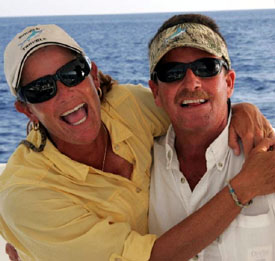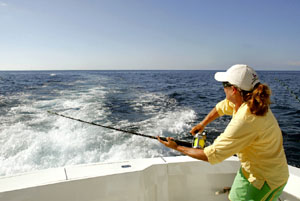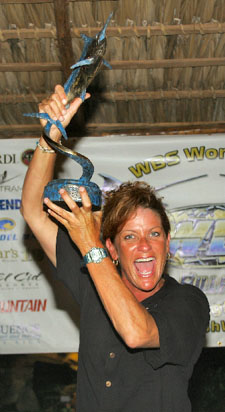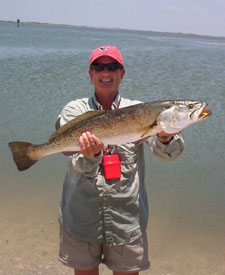TAMI NOLING - A WOMAN & WORLD CHAMPION IN THE SPORT OF FISHING
 Fishing is a sport that has long been dominated by men. This hasn't stopped lady angler Tami Noling from not only joining in on the fun, but also making a name for herself in the international sports fishing community. However, in her rise to fame, Noling's two favorite men - her father and husband - have been there to provide their support. Fishing is a sport that has long been dominated by men. This hasn't stopped lady angler Tami Noling from not only joining in on the fun, but also making a name for herself in the international sports fishing community. However, in her rise to fame, Noling's two favorite men - her father and husband - have been there to provide their support.
"I started fishing with my father in the bays along the Texas Gulf Coast when I was three years old," Noling explains. "I decided early that I wanted to try and catch every kind of fish that swam."
This early dream is perhaps the reason why Noling will happily tell you, "I don't really have a favorite species because any fish I catch is equally fun to me, whether it's a speckled trout or a blue marlin. I just love fishing and do it every chance I get."
It was 1978 when Noling moved from the landlocked Texas town of San Antonio to Rockport, a small Gulf Coast town with plenty of sports fishing boats docked at the local marinas. "I finally went on my first marlin fishing trip in 1988 with friends to Cabo San Lucas. The trip was a success! I got to catch a striped marlin and a blue marlin my first day."
Blue marlin are the focal point of Noling's best fish story of her career to date and two of her best fishing days.
As for the story, she tells, "We were in the traveling mode on our way to St. Thomas from Florida back in 1993. It was myself, my husband and good friend Sam Canterbury aboard. We were chugging along with a couple of 80's rigged up just for grins, like so many of us do when traveling. One line came crashing down out of the rigger, so I climbed over fuel drums and a dock box to grab it. Then, I jumped in the chair and began to crank, not having seen the fish yet. Sam cleared the other line but didn't realize the lure was still dangling in the water. Another smaller blue, about a 200-pounder, grabbed the dangling lure right beside the boat, so now we had a double header on. Sam got that one in pretty quick, so we were able to start backing down on mine. I got her to the leader in about 15 minutes but when Sam reached out to wire the fish, she jumped and missed ripping the outrigger down by inches. We were all speechless when we saw how big she was! About 800 pounds! It was awesome. She tried to spool me after that but I managed to get her to the boat about 45 minutes later. There was a short pause after we watched her swim away before anybody could manage to say anything. We were just amazed at what had just happened. One minute we were eating chilidogs and the next minute we were in the middle of a lifetime memory. I'll never forget it," Noling says. Then, I jumped in the chair and began to crank, not having seen the fish yet. Sam cleared the other line but didn't realize the lure was still dangling in the water. Another smaller blue, about a 200-pounder, grabbed the dangling lure right beside the boat, so now we had a double header on. Sam got that one in pretty quick, so we were able to start backing down on mine. I got her to the leader in about 15 minutes but when Sam reached out to wire the fish, she jumped and missed ripping the outrigger down by inches. We were all speechless when we saw how big she was! About 800 pounds! It was awesome. She tried to spool me after that but I managed to get her to the boat about 45 minutes later. There was a short pause after we watched her swim away before anybody could manage to say anything. We were just amazed at what had just happened. One minute we were eating chilidogs and the next minute we were in the middle of a lifetime memory. I'll never forget it," Noling says.
"My best day on a boat," she says, "was when my husband, Capt. Dave Noling, crew and I caught a dozen blue marlin in one day off Venezuela."
Of course, she adds, "I think my best personal day was during the World Billfish Series (WBS) Championship when I caught four sailfish, two blue marlin and a striped marlin on the third and final day of the tournament. It was my first Pacific Grand Slam."
 Winning the 2005 WBS was the highlight of Noling's career. "It was really a great feeling to win such an event while fishing against so many excellent angers and crews. To be the first woman to do it was quite a rush!" Winning the 2005 WBS was the highlight of Noling's career. "It was really a great feeling to win such an event while fishing against so many excellent angers and crews. To be the first woman to do it was quite a rush!"
As for fishing method, Noling says, "I'm pretty partial to 30-pound test for billfishing. I really enjoy catching big fish on light tackle. But when we're in St. Thomas or other places with bigger marlin, I won't usually go any lighter than 50-pound because anything lighter can lead to a long battle which is really hard on the fish. I think the quicker you can reel in a fish the easier it is on both parties involved!"
Noling regularly competed in the Bisbee Black and Blue Tournament in Cabo San Lucas and the Los Suenos Signature Series in Costa Rica. "I try to fish the Boy Scout tournament (USVI Open/Atlantic Blue Marlin Tournament) in St. Thomas every year, and have fished it more than other tournaments, but have missed it the last couple of years."
She adds, "I hope to be there for this year, though. In fact, our boss, Darren Casey just bought a 59-foot Paul Spencer that we hope to have ready in time for the Boy Scout tournament. We've been fishing aboard the 60-foot Hatteras, Double Trouble, for the last three years."
Although Noling regularly competes in, and places, in many tournaments, she says her favorite is the Boy Scout. "I think it is by far the best gathering of captains and crews in the world. I visit a lot of marinas throughout the year, filled with some nice people and some not-so-nice people. But you can't beat the crowd that gathers in St. Thomas every year when the marlin season rolls around. I always feel like I'm among family when I'm there...and you just don't get that feeling any place else."
Although Noling fishes mainly with her husband - to the tune of 100 days billfishing and 100 days bay fishing when she's not booking fishing trips for a living - she's also angled with a real Who's Who of sports fishing captains. These include: Capt. Randy Jenderse, Capt. Billy Borer, Capt. Desi Zenar, Capt. "Bubba" Carter, Capt. John Uhr, Capt. Gregg Newell, Capt. Robbie "Cujo" Brinkmeyer, Capt. Lee Alonzo, Capt. Terry Robinson, Capt. Eddie Morrison, Capt. Jorge More, Capt. Cesar Peinate, Capt. Alberto Sanchez, Capt. Arturo Moreno, Capt. Eddie Wimbrow, Capt. Eddie Windes, and Capt. Brad Simmons.
 Noling says, "I used to fish just mainly in the Caribbean... St. Thomas, Venezuela and Mexico. But the last three years I've been in the Pacific quite a bit. For example, after St. Thomas and Venezuela, we hope to head to Cabo, Mazatlan and then finish up the year in Costa Rica." Noling says, "I used to fish just mainly in the Caribbean... St. Thomas, Venezuela and Mexico. But the last three years I've been in the Pacific quite a bit. For example, after St. Thomas and Venezuela, we hope to head to Cabo, Mazatlan and then finish up the year in Costa Rica."
Where does Noling see the sports fishing industry moving to in the future?
"If more tournaments will turn to releasing instead of killing fish...we'll all get to have fun for a lot longer than if they don't," she says. "Generation after generation will continue to be able to have as much fun as we have. I mean, we're all out there hooking and reeling in fish, and some people say they die anyway, but that's not always true. Back when we used to tag every fish we caught in Venezuela, we re-caught and released or heard of others catching and re-releasing fish with our tags in them. So, conservation is effective and more should do it. I think those that practice conservation should all pat themselves on the back for a job well done. And, those that don't should conk themselves on the head with an iron skillet!"
|
|
|
|
|
|
